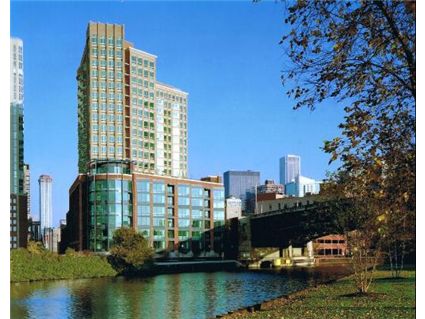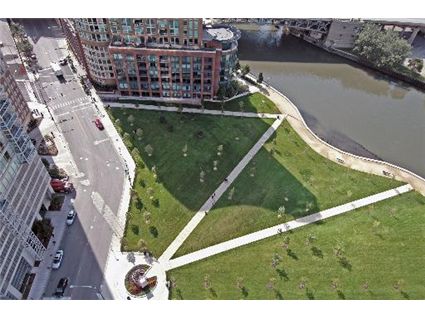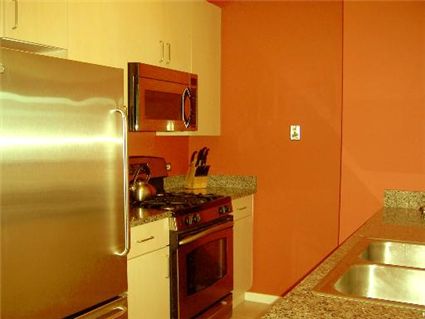Steals and Deals: A two bedroom in River North under $375k
Why buy a one bedroom in River North or Streeterville when you can buy a two bedroom for much less?
For those looking to buy, it pays to look at the high rises that are slightly older. Such is the case with Park Place at 600 N. Kingsbury on the edge of River North near the Chicago River. When the building was built in 2002, it was the far edge of River North and there was a “proposed” park to be built in front of the building.


Flash forward 6 years and the park is complete and there are several new high rises nearby. Suddenly, the far west edge of River North doesn’t seem so “far.”
One listing for one of the smaller two bedroom, two bath floorplans says that the “seller is relocating, very motivated!”



Unit #1512: 2 bedroom, 2 bath, 1052 square feet
- Sold in September 2003 for $329,000
- Currently listed for $344,000 plus $30,000 for parking
- Assessment of $507 a month
- Re/Max Signature has the listing
Is this a “deal” at this price point? That is $335 a square foot (excluding the parking).
If the only issue is whether this is a “deal” at this price point, and forgetting precise location and other issues, IMO the answer is “no” since I think before year-end, if not sooner, you will be able to obtain a 2 bedroom 2 bath in river north for under 300K (at such places as The Sterling and Millenium Centre among others).
I’ve relaxed in that park. It’s really nice. But living right there… you would need to get used to the constant drone of traffic on the Ohio feeder ramp next door. It’s noisy!
I don’t think there’s much in the way of transit in that little corner of River North, either.
Let’s see, buy an illiquid, depreciating asset or rent it for at least 30% less than the cost of ownership?
Geez, I just don’t know.
G: You’d be surprised how many people are still buying that first condo right now. It will take awhile for people to realize that real estate is no longer going up in price. There is a whole generation (or two) that has never seen a stagnant (let alone declining) housing market.
Read this article because it has a lot of good things to remember… “Remember, the real successful investors didn’t buy in 2004 or 2005. The most savvy investor saw the profit potential as early as 2002. Many more climbed on the magic bus in 2003. But as 2004 started to see a historic spike in selling prices the best investors read the writing on the wall and the sell off began. The sell off continued into mid-2005 with good profits being made. But these were left-over sales of homes being purchased by late-comer (too late) investors and home-buyers who were concerned if they waited any longer home prices would be out of their price range. By the end of 2005 the housing market was on life support, the public just didn’t know it yet.
Investors know real estate investing is a cyclic beast. The golden rule of the investor has a large “duh” factor pinned to it, but it holds true in its simplest form, “Buy low, sell high.” The second rule married to this global profit-making truth is, “and don’t be greedy.” I can’t tell you how many sellers I talk to who can’t sell their homes today, but had offers in 2004 and 2005 of tens and even hundreds of thousands of dollars more than what they are currently listing the home for today. They past up huge profits with the expectation of making “just a little bit more” a year later. It was gold fever 21st century style.
So, you buyers out there are asking yourself, “Is it time to be in with the same lot of savvy investors of 2002/2003?” No one expects to see a return of gains seen in 2004/2005 over the next 2-3 years. So don’t go into the real estate market with the expectation of flipping a home within months of purchasing. If you are looking for a safe bet investment over a 5 year or longer period or you are looking to purchase a retirement or vacation home then NOW is the time to purchase.
Investors are beginning to buzz out there and interest rates will not hold this low forever. Expect to see interest rates start to climb in 2008 and 2009. Some have even predicted double digit interest rates (remember the 1980’s?). The U.S. dollar has taken a pounding partly due to these low rates. Although, the silver lining to this is foreign investors taking advantage of their high currency conversion rates and the low U.S. housing prices.”
“How do you determine when the real estate market will make the turn and head up?
We talk to buyers every week that are hoping to win the real estate lotto. They want the best possible deal they can get on their dream home (Who can blame them?). But, many of them are hoping to hit the lotto. Their fear and/or obsession with buying their home at the bottom of the market may cost them the house they desire at a really good price.
We explain that interest rates are still at historic lows; that sellers are motivated and the selection of homes is fantastic, but – “when will the market hit bottom?” – they ask.
I’ll tell you when the market will hit bottom – right before it starts heading back up. You’ll know this in hindsight because no one can tell you the day and the hour that the market will turn and home prices will start climbing again; inventory will drop”
Norm, go ahead and buy yourself a 2/2 in the Sterling for 300k. That building is complete garbage. It’s a perennial loser just like the Washington Generals and American Invesco. Any building American Invesco has converted has failed miserably.
I would take any unit at 600 N Kingsbury overpriced or not over any Unit purchased at the Sterling. In 10 years I guarantee my unit at 600 Kingsbury would have a better return.
City Agent: Rents don’t cover the cost of home ownership right now (even, in some cases, with the foreclosures and bank owned properties.) Why would now be a good time to buy as an investment? Because prices have come down a bit and inventory is higher?
The financials still don’t make any sense.
Sabrina,
I’m comparing the Sterling (which is complete garabage) to 600 Kingsbury or any building in River North for that matter. I’m not talking about buying for investment I’m talking about buying for your primary residence. Inventory has gone up but it will come back down.
Anyway, just so you know rent prices are on the rise…Read the following…
(“It seems like the tide has finally turned,” said Michael Zaransky, the co-chief executive of Prime Property Investors, which owns 15 buildings in Chicago.
Rents in about 85 percent of large U.S. metropolitan areas have climbed in the last year, according to Global Real Analytics, a research company in San Francisco. In late 2003, rents were falling in 85 percent of markets.
In Chicago, people who moved into a small brick building on the leafy corner of Sherwin Avenue and Paulina Street two years ago had it very good. They did not have to put down a security deposit, the $50 application fee was waived, and, best of all, they got to live rent-free for two months.By last summer, the enticements had shrunk to just one month of free rent. Today, all that a new tenant receives for signing a $1,100-a-month lease are the keys to the front door.
Some apartment owners have raised the effective rent on their apartments by cutting back on those concessions while keeping the announced monthly rent roughly the same.
Other landlords have become pickier about which tenants they accept, no longer signing leases with those who have spotty credit records or who must stretch to afford the rent, said Paul Magyar, director of leasing at Chicago Apartment Finders, a listing service.)
Sabrina, I don’t think City Agent wants to talk about the “financials”.
I am beginning to doubt that he/she can. Its not like it is required knowledge for Realtors(tm), is it?
This used home salesperson’s lack of knowledge and obvious denial is remarkable. Or is it just the norm?
City Agent:
I believe the only question Sabrina posed, to which I responded, was “is this a ‘deal’ at this price point?” My response expressly stated “forgetting price and other issues” that the answer is “no.” Your retort mentions the very type of “other issues” I disregarded for the question.
Having said that, this unit is probably nicer than the Sterling, though I think the location is worse, but the price is STILL TOO HIGH and NOT a deal in this market.
Prices in river north and elsewhere in the downtown area for condos will continue to decrease (in my opinion) though, if you are a real estate agent, I certainly understand why you might say you disagree, why it is in your economic interests to say you disagree, and why you might even think you are doing your clients a service to disagree.
G: As for your last comment above, I think you might infer that I believe it is the “norm” and no pun intended.
I think that a lot of arguments we are seeing here are very one sided. We tend to either focus either on rising inventory, subprime crises and increasing number of foreclosures, or look at the bright future that brings us 2016 Olympics, increasing construction and land costs and steady job growth. The problem is that it is really both. Look at Manhattan prices(or any other major city in the world), can they be justified with income levels or rent costs? off course not. But people are buying nevertheless. I think population growth, Chicago’s attractiveness as a place to live and work and a steady job growth for the Chicago metropolitan area are very important factors, and should be considered when discussing real estate’s future. Also, the reason for buying real estate should be distinguished, buying an investment, or buying a primary residence. Tax benefits along with aesthetic values need to be considered as well. Some people do want to own.
Consider owning vs. leasing an automobile. You can build an argument either way, but everyone would tend to focus on what’s important to them. And why would anyone buy a depreciating asset anyway, right?
Manhattan is in a bubble too and prices will fall drastically there as well. It is already starting and it is nothing new for NYC. It is denial to believe that Chicago can avoid the same fate after the bubble which began in the late 1990’s.
The historic ‘rent:sale price’ and ‘median income:sale price’ ratios will return. Nobody can stop the ‘invisible hand’ of the market no matter what kool-aid they drink or how many times the Realtor(tm) shills keep filling their glasses.
It is correct that people buy depreciating assets all the time, as nearly every consumer good falls in this category. I don’t think it is accurate to compare that to the fact that condos are depreciating as if THAT fact would not impact a buyer. We all know autos will depreciate and even a used car salesperson would not say otherwise. What do you suppose would happen if all used home salespeople were as honest as that?
I am still waiting for some bubble deniers to show me a Loop or near-Loop condo that makes sense to buy as opposed to rent. With real numbers and calculations and not just “feelings.” Could it be that anyone with the skills to make financial calculations are no longer denying the bubble?
Does anyone think this is a reasonable way to figure out the “real” value of a place in Chicago: Take what it sold for in 1998 (last prebubble year, right?), appreciate at 3% a year, et voila–that is the historical “worth” of the unit? And so, that is the price we can expect it to normalize to when all is said and done?
The 3% is the long term appreciation people usually cite for real estate. It also accounts for depreciation–inflation alone is historically 4%; which means that your home is effectively depreciating at 1% per year.
Too simple? What am I missing?
G,
I won’t be able to tell you what’s happening right now until I have the data just like any other market but can tell you whats happened in the last 10 years as far as sales prices. Just like any market you need to trust that your working witht the best and know what your getting into??? Real Estate is for people willing to take “Risk” just like anyone entering into markets like NASDAQ, NYSE, S&P 500, CHICAGO Merc, COMMIDITIES/GOLD, CURRIENCES, ETC.
Here are the numbers for areas located in Chicago Market from the past 10 years… I took these numbers from the Chicago Association of Realtors. This is for a TYPE 2 attached homes which is basically anything that shares a wall (condo, townhome, co-op, etc.)
Enjoy…
8001 CHICAGO – ROGERS PARK
8002 CHICAGO – WEST RIDGE
8003 CHICAGO – UPTOWN
8004 CHICAGO – LINCOLN SQUARE
8005 CHICAGO – NORTH CENTER
8006 CHICAGO – LAKE VIEW
8007 CHICAGO – LINCOLN PARK
8008 CHICAGO – NEAR NORTH SIDE
8009 CHICAGO – EDISON PARK
8010 CHICAGO – NORWOOD PARK
8011 CHICAGO – JEFFERSON PARK
8012 CHICAGO – FOREST GLEN
8013 CHICAGO – NORTH PARK
8014 CHICAGO – ALBANY PARK
8015 CHICAGO – PORTAGE PARK
8016 CHICAGO – IRVING PARK
8017 CHICAGO – DUNNING
8018 CHICAGO – MONTCLARE
8019 CHICAGO – BELMONT CRAGIN
8020 CHICAGO – HERMOSA
8021 CHICAGO – AVONDALE
8022 CHICAGO – LOGAN SQUARE
8023 CHICAGO – HUMBOLDT PARK
8024 CHICAGO – WEST TOWN
8025 CHICAGO – AUSTIN
8026 CHICAGO – WEST GARFIELD PARK
8027 CHICAGO – EAST GARFIELD PARK
8028 CHICAGO – NEAR WEST SIDE
8029 CHICAGO – NORTH LAWNDALE
8030 CHICAGO – SOUTH LAWNDALE
8031 CHICAGO – LOWER WEST SIDE
8032 CHICAGO – LOOP
8033 CHICAGO – NEAR SOUTH SIDE
8034 CHICAGO – ARMOUR SQUARE
8035 CHICAGO – DOUGLAS
8036 CHICAGO – OAKLAND
8037 CHICAGO – FULLER PARK
8038 CHICAGO – GRAND BOULEVARD
8039 CHICAGO – KENWOOD
8040 CHICAGO – WASHINGTON PARK
8041 CHICAGO – HYDE PARK
8042 CHICAGO – WOODLAWN
8043 CHICAGO – SOUTH SHORE
8044 CHICAGO – CHATHAM
8045 CHICAGO – AVALON PARK
8046 CHICAGO – SOUTH CHICAGO
8047 CHICAGO – BURNSIDE
8048 CHICAGO – CALUMET HEIGHTS
8049 CHICAGO – ROSELAND
8050 CHICAGO – PULLMAN
8051 CHICAGO – SOUTH DEERING
8052 CHICAGO – EAST SIDE
8053 CHICAGO – WEST PULLMAN
8054 CHICAGO – RIVERDALE
8055 CHICAGO – HEGEWISCH
8056 CHICAGO – GARFIELD RIDGE
8057 CHICAGO – ARCHER HEIGHTS
8058 CHICAGO – BRIGHTON PARK
8059 CHICAGO – MCKINLEY PARK
8060 CHICAGO – BRIDGEPORT
8061 CHICAGO – NEW CITY
8062 CHICAGO – WEST ELSDON
8063 CHICAGO – GAGE PARK
8064 CHICAGO – CLEARING
8065 CHICAGO – WEST LAWN
8066 CHICAGO – CHICAGO LAWN
8067 CHICAGO – WEST ENGLEWOOD
8068 CHICAGO – ENGLEWOOD
8069 CHICAGO – GREATER GRAND CROSSING
8070 CHICAGO – ASHBURN
8071 CHICAGO – AUBURN GRESHAM
8072 CHICAGO – BEVERLY
8073 CHICAGO – WASHINGTON HEIGHTS
8074 CHICAGO – MOUNT GREENWOOD
8075 CHICAGO – MORGAN PARK
8076 CHICAGO – O’HARE
8077 CHICAGO – EDGEWATER
% change is change in sale price…. Your probably going to have to print this post to match everything up. The 1st #’S line up to Rogers Park and the Last #’S go to Edgewater…
% Change % Change % Change
1 Year 5 Year 10 Year
2% 114% 45%
22% 226% 82%
1% 159% 31%
5% 84% 47%
10% 149% 98%
11% 130% 44%
25% 143% 45%
-2% 149% 31%
5% 246% -15%
13% 300% 36%
-12% 373% 48%
58% 167% 98%
65% 417% 266%
48% 147% 152%
-18% 155% 17%
1% 184% 100%
22% 227% 20%
15% 482% 120%
35% 40% 33%
-68% -36% #DIV/0!
3% 86% 70%
4% 81% -25%
-42% 162% 642%
15% 12% -1%
11% 122% 28%
18% #DIV/0! 0%
22% 108% -72%
33% 231% 113%
62% -51% 120%
#DIV/0! #DIV/0! #DIV/0!
24% 8300% #DIV/0!
-39% 31% -36%
15% 68% -14%
-100% -100% #DIV/0!
-15% 59% 109%
13% #DIV/0! #DIV/0!
54% 52% #DIV/0!
-9% 42% 157%
-15% 20% 85%
-23% -24% #DIV/0!
6% 133% 66%
-21% 17% 211%
-18% 71% 52%
-13% 62% 105%
-58% -66% -71%
137% 131% #DIV/0!
#DIV/0! #DIV/0! -66%
19% 46% -31%
90% 23% -27%
-5% 127% -20%
-22% -28% -10%
46% 920% -11%
21% -32% -41%
-67% 240% #DIV/0!
-100% -100% #DIV/0!
36% 261% 166%
-69% 9% #DIV/0!
#DIV/0! #DIV/0! #DIV/0!
-59% #DIV/0! #DIV/0!
-32% -50% #DIV/0!
#DIV/0! 408% #DIV/0!
35% 32% -8%
304% 88% 205%
-12% 200% 58%
103% 228% 431%
-82% 300% #DIV/0!
#DIV/0! -100% #DIV/0!
15% #DIV/0! #DIV/0!
-44% 31% -3%
-28% 0% 14%
-26% -54% -4%
54% 180% 121%
#DIV/0! -63% #DIV/0!
-51% -41% -46%
65% 159% 112%
21% 233% 33%
-1% 171% 68%
Kenworthy: the “real” value will be determined when the median price of a Chicago area condo stabilizes for an extended period of say one year and will be based on comps within the last six months. It seems that foreclosed properties will lead the way in price reductions and slowly force f’ed condo sellers to budge and lower their prices. The more desperate the condo seller reason to sell: divorce, financial troubles, relocation, job loss, screwed flipper, etc. will also expedite the process.
City Agent: Don’t you agree that past performance is not indicative of future results? You can give us charts of all of the great appreciation of the last 10 years in Chicago (which has been huge for many homeowners) but what about the ten years before that where prices were stagnant for years?
The price increases you list only confirm the thesis of many people – that incomes haven’t even come close to going up as much as housing has and something has to give. Housing can’t keep outperforming incomes for forever.
I agree that rents are rising. The new rental apartment buildings are renting very quickly at high rental rates. And the landlords are not giving out any deals. But the rental condo inventory is large and there are deals to be had. And rents would have to rise enormously to make the rent v. buy equation come back into equilibrium. Which would also mean housing prices would have to stay flat for years for that to happen.
If housing prices are flat for years- what is the rush to buy right now? There is none.
Two thoughts:
1. The rent vs buy calculation is not relevant for many people who buy to get something they really want to live in. It is a quality of life decision, not necessarily a financial one… A different take on G’s point, just like a car purchase. You may know it will depreciate a little, but it is the one you want. If it stays flat that is just a bonus. This may not hold at all on the fringes of the city or in the middle of no where, but in downtown Chicago I think there is something to be said for people not making the decision completely based on finances.
Development in the rental market is a strictly financial decision based on a lot of data from both the demand and supply side and with cash flow over the long term in mind… condo developers do look at these numbers, but condos have a high sales component to them. They have to build things that people will want to buy. Emotion is and always has been part of buying a property and has to be considered. The only time you can say take feelings out of it is if you are trading in real estate, like a ‘flipper’. For everyone else feelings do have a lot to do with it.
2. To the financial side… people rarely mention the tax benefits of holding property over 2 years. If you see things better in a couple of years then you gain a big advantage by having lived there for a couple of years. When things appreciate you can either undercut other ‘flippers’ or just enjoy more of that money tax free. There is a point on the curve where it becomes better financially to not just pick the exact bottom, but somepoint before as the curve is beginning to level out. Maybe now, maybe 2 years, maybe 5. I don’t know, no one does, but the thought is worth mentioning.
Don’t worry Sabrina, I wouldn’t be surprised to find new regulations in place that require the ‘past performance’ disclaimer in the future from all Realtors(tm) due to the Great Housing Ponzi Scheme of the new millenium. I would imagine something along the lines of “compliance officers” will also be proposed for the RE sales industry.
The list of past appreciation that City Agent posted in response to my request for any financial information showing that buying now makes sense versus renting is all too revealing. Why not just come out and say it: “Real estate always goes up.”
Mike, of course the “real” value can only be determined in retrospect as you describe. However, I think Kenworthey is asking for an estimate.
I agree in principle with the method she has proposed but would not rely upon it entirely. It is important to also consider the same calculation with annual increases/decreases based upon inflation, median household income, and rents. I think this is important in Chicago in order to reflect areas that have undergone real gentrification (with actual increase of median income).
The additional method I would utilize would be to look at rents and historical rates of return (which the market will return to with the death of speculation and cheap and/or easy money).
Reconcile the results of the various methods based on the quality of the input data and you will get a decent estimate of where a property is headed.
Of course, there will be knife-catchers and bottom-callers all along the way down, which is why a real estate bottom takes some time to achieve. Regardless, it will eventually overcorrect downward, rise slightly, and then stagnate for years. It will be very hard to “miss” the bottom.
G, it is impossible to tell what most of these condos built in the last five years will be worth since they haven’t been around before the bubble years. They were already bought at bubble prices. It seems that Kenworthy is looking to buy in the general loop area in one of the newer high rises. Until these foreclosures clear and do their respectable damage, we can only estimate what the likely depreciation will be. Hence, on the safe side, one would need to look to see if prices have stabilized for an extended period and you are right, that it will be impossible to miss the bottom. The bottom will be reached when everyone and your mom and dad will say that real estate is a bad investment. Then, it will be time to buy. Now you are gambling your money away trying to knife catch.
It will be interesting to see the intestinal fortitude of the investors who are up-side down on their mortgages and attempting to flip or rent their unit.
I agree with you completely, Mike.
Your point about the new construction built during the bubble is a good one. They were sold originally at bubble prices so I fully expect them to sell for less than the developer’s original prices. There are already signs of this, even for buildings opened in the early bubbly years. The 2004-current (and let’s not forget the looming future) deliveries will prove to be an absolute financial disaster for those who bought.
Did you mean to say “speculators” instead of “investors” in your last paragraph? I haven’t seen any real estate investors for quite a few years around here.